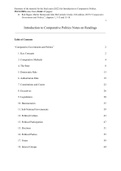Samenvatting
Summary Introduction to Comparative Politics Notes on Readings - GRADE 7,0
- Instelling
- Universiteit Leiden (UL)
Summary of the material for the final exam (2022) for Introduction to Comparative Politics. INCLUDES notes from (Total: 69 pages): Rod Hague, Martin Harrop and John McCormick’s book (11th edition 2019) “Comparative Government and Politics”, chapters 1, 3-13 and 15-18.
[Meer zien]





